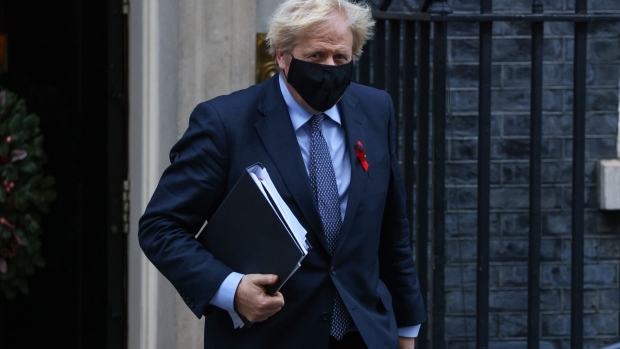Dec 3, 2020
Johnson Says U.K. Will Look at Tax, Rules to Stimulate Business
, Bloomberg News

(Bloomberg) -- Boris Johnson said the U.K. will examine its tax and regulatory environment as it tries to stimulate British business in the wake of the coronavirus pandemic.
The premier said he’s “absolutely sure” businesses will “bounce back strongly” next year as the U.K. deploys vaccines and ramps up mass testing to curb the spread of the outbreak, which has wrought havoc on the economy over the past nine months. He said Chancellor of th Exchequer Rishi Sunak is looking at the fiscal and regulatory tools available to him.
“We’ll be looking at the tax environment, the regulatory environment and everything to encourage and support businesses across the country,” Johnson said Thursday in a question-and-answer session with members of the public aired on Facebook.
The premier’s comments suggest Sunak may ease burdens on business in order to stimulate the economy, even as the chancellor himself warns about the need to rein in the budget deficit, which is forecast to rise to 394 billion pounds ($530 billion) in the current tax year -- a peacetime record.
Business groups have been calling for measures including reforms to business rates and a cut in employer national insurance contributions in order to help stimulate a recovery.
Difference by Easter
Johnson said that “mass testing, combined with the number of people who have been vaccinated will make a real difference, I think, before Easter.” He told one questioner, who worked in the weddings industry, that “we’ll be in a different world” by the summer.
“You should be able to plan for a really much more active summer and lots of happy nuptial events all around the U.K.,” he said, before shaking off a query about his own plans to marry his fiancee, Carrie Symonds, saying: “I didn’t want to drag that in, but anyway, I’ll have to take that one offline.”
The premier also said that “there will be a lot of work to be done looking at the lessons to be learned.” He lamented that not enough was known in January and February about the full extent of asymptomatic transmission of the virus.
“I just wish we’d realized how much the disease could be transmitted without symptoms,” Johnson said. “If we’d known that single fact, it could have made a big difference to our early response.”
Scientific Advice
Documents from early meetings of the government’s Scientific Advisory Group on Emergencies suggest an evolving understanding of transmission of the virus in January and February.
Minutes of the group’s first meeting on the pandemic on Jan. 22 state that “there is no evidence yet on whether individuals are infectious prior to showing symptoms.” A Jan. 28 document concluded there was not yet enough data to “provide evidence for major asymptomatic/subclinical transmission.”
A Feb. 4 meeting said asymptomatic transmission couldn’t be ruled out, and minutes from Feb. 11 state that “virus shedding” -- the release of viral particles through speaking, eating or coughing, “may reach significant levels just before onset of symptoms.” But a Feb. 17 paper stated that infectiousness of Covid “is generally believed to coincide with, but not precede, clinical symptoms.”
©2020 Bloomberg L.P.






